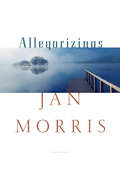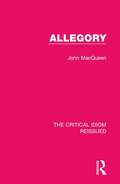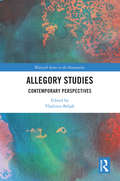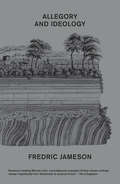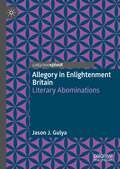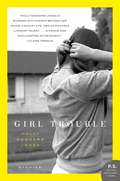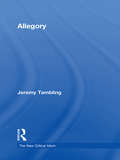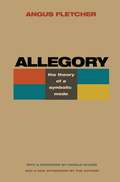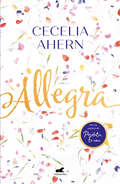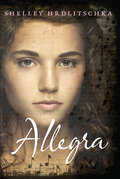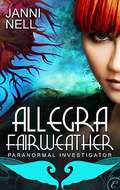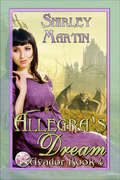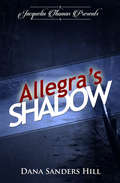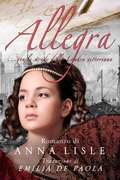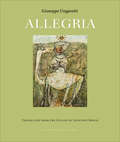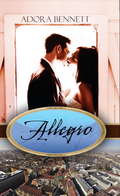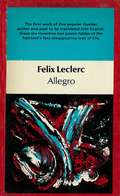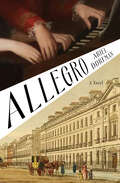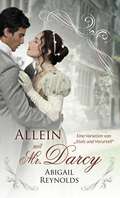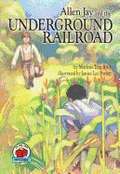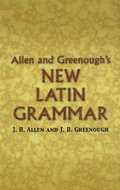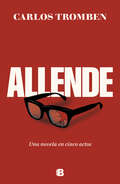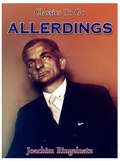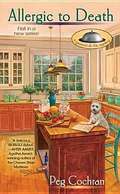- Table View
- List View
Allegorizings
by Jan MorrisNew York Times Book Review • Editors' Choice Jan Morris delivers her final volume, brimming with reminiscences, meditations on daily life, and mini-essays on everything from maturity to whistling to Princess Diana. Not so long ago, feeling intimations of mortality, Jan Morris embarked on a wholly novel literary enterprise. What began as a series of high-minded letters to her late daughter—in the style of Lord Chesterfield addressing his son—quickly transformed itself into a potpourri of mini-essays and vibrant reminiscences, organized around experiences both majestic and mundane, from traveling the world with her lifelong partner, Elizabeth, to sneezing and kissing and simply growing old. So Allegorizings came to be, and so Morris decided that it should only be published upon her death, not because she had anything to hide but, merely, in parting. Featuring essays largely written in the early twenty-first century, Allegorizings reflects, above all, Morris’s steadfast conviction that nothing is only what it seems. In fact, she observes, everything is allegory. Indeed, in Morris’s telling, even life—the whole conundrum of existence—is one long, majestically impenetrable allegory. Taking us from the separatist hippie colony of Bolinas, California, to her home country of Wales, and introducing us to Nepalese Sherpas and elderly cruise-goers alike, Morris follows the throughline of allegory throughout her works. In one essay, she lambasts the joylessness of maturity (“Maturity! Did ever a heart thrill to the sound of it, still less the meaning?”) and in another, decries the nonsense of nationality. With characteristic verve, she offers odes to whistling and cursing, cats, and exclamation points. Morris’s travels anchor the collection, as she revisits the iconic settings of her previous works. We join her aboard the storied Orient Express, as well as tube trains passing through the purlieus of London. So too, we hike the foothills of the Himalayas—where Morris burst onto scene with her on-the-spot reportage of the first ascent of Everest—and reflect on the picaresque allure of Tournus, a dichotomized town in France where one France, bearing all the vestiges of privilege, seems to kiss another. Intimate and luminously wise, Allegorizings is as much a testament to the virtues of embracing life as it is a testament to its charming, indignant, and ever-surprising author. In her final work, Morris’s writing is as erudite as ever, conveying a generosity of spirit “flavored by well-earned crankiness” (Vox). Though newly bereft of her company, readers will be reminded what “a good, wise, and witty companion” (Alexander McCall Smith) Morris has been to so many, for so long.
Allegory (The Critical Idiom Reissued #13)
by John MacQueenFirst published in 1970, this book examines the use of allegory in religious, philosophical and literary texts. It traces the development of the device over time from the Classical period through to the early modern and modern periods, demonstrating its evolution from the transmission of myths and religious beliefs to a literary device.
Allegory Studies: Contemporary Perspectives (Warwick Series in the Humanities)
by Vladimir BrljakAllegory Studies: Contemporary Perspectives collects some of the most compelling current work in allegory studies, by an international team of researchers in a range of disciplines and specializations in the humanities and cognitive sciences. The volume tracks the subject across established disciplinary, cultural, and period-based divides, from its shadowy origins to its uncertain future, and from the rich variety of its cultural and artistic manifestations to its deep cognitive roots. Allegory is everything we already know it to be: a mode of literary and artistic composition, and a religious as well as secular interpretive practice. As the volume attests, however, it is much more than that—much more than a sum of its parts. Collectively, the phenomena we now subsume under this term comprise a dynamic cultural force which has left a deep imprint on our history, whose full impact we are only beginning to comprehend, and which therefore demands precisely such dedicated cross-disciplinary examination as this book seeks to provide.
Allegory and Ideology
by Fredric JamesonFredric Jameson takes on the allegorical formWorks do not have meanings, they soak up meanings: a work is a machine for libidinal investments (including the political kind). It is a process that sorts incommensurabilities and registers contradictions (which is not the same as solving them!) The inevitable and welcome conflict of interpretations - a discursive, ideological struggle - therefore needs to be supplemented by an account of this simultaneous processing of multiple meanings, rather than an abandonment to liberal pluralisms and tolerant (or intolerant) relativisms. This is not a book about "method", but it does propose a dialectic capable of holding together in one breath the heterogeneities that reflect our biological individualities, our submersion in collective history and class struggle, and our alienation to a disembodied new world of information and abstraction. Eschewing the arid secularities of philosophy, Walter Benjamin once recommended the alternative of the rich figurality of an older theology; in that spirit we here return to the antiquated Ptolemaic systems of ancient allegory and its multiple levels (a proposal first sketched out in The Political Unconscious); it is tested against the epic complexities of the overtly allegorical works of Dante, Spenser and the Goethe of Faust II, as well as symphonic form in music, and the structure of the novel, postmodern as well as Third-World: about which a notorious essay on National Allegory is here reprinted with a theoretical commentary; and an allegorical history of emotion is meanwhile rehearsed from its contemporary, geopolitical context.
Allegory in Enlightenment Britain: Literary Abominations
by Jason J. GulyaThis Palgrave Pivot argues for the significance of allegory in Enlightenment writing. While eighteenth-century allegory has often been dismissed as an inadequate form, both in its time and in later scholarship, this short book reveals how Enlightenment writers adapted allegory to the cultural changes of the time. It examines how these writers analyzed earlier allegories with scientific precision and broke up allegory into parts to combine it with other genres. These experimentations in allegory reflected the effects of empiricism, secularization and a modern aesthetic that were transforming Enlightenment culture. Using a broad range of examples – including classics of the genre, eighteenth-century texts and periodicals – this book argues that the eighteenth century helped make allegory the flexible, protean literary form it is today.
Allegory of a Cave
by Holly Goddard JonesIn Girl Trouble, acclaimed writer Holly Goddard Jones examines small-town Southerners aching to be good, even as they live in doubt about what goodness is. A high school basketball coach learns that his star player is pregnant--with his child. A lonely woman reflects on her failed marriage and the single act of violence, years buried, that brought about its destruction. In these eight beautifully written, achingly poignant, and occasionally heartbreaking stories, the fine line between right and wrong, good and bad, love and violence is walked over and over again. In "Good Girl," a depressed widower is forced to decide between the love of a good woman and the love of his own deeply flawed son. In another part of town and another time, thirteen-year-old Ellen, the central figure of "Theory of Realty," is discovering the menaces of being "at that age": too old for the dolls of her girlhood, too young to understand the weaknesses of the adults who surround her. The linked stories "Parts" and "Proof of God" offer distinct but equally correct versions of a brutal crime--one from the perspective of the victim's mother, one from the killer's. Written with extraordinary empathy and maturity, and with the breadth and complexity of a novel, Jones's stories shed light on the darkness of the human condition.
Allegory: Allegory And Literature Of The City (The New Critical Idiom)
by Jeremy TamblingIndispensable to an understanding of Medieval and Renaissance texts and a topic of controversy for the Romantic poets, allegory remains a site for debate and controversy in the twenty-first-century. In this useful guide, Jeremy Tambling: presents a concise history of allegory, providing numerous examples from Medieval forms to the present day considers the relationship between allegory and symbolism analyses the use of allegory in modernist debate and deconstruction, looking at critics such as Walter Benjamin and Paul de Man provides a full glossary of technical terms and suggestions for further reading. Allegory offers an accessible, clear introduction to the history and use of this complex literary device. It is the ideal tool for all those seeking a greater understanding of texts that make use of allegory and of the significance of allegorical thinking to literature.
Allegory: The Theory of a Symbolic Mode
by Angus FletcherAnyone who has ever said one thing and meant another has spoken in the mode of allegory. The allegorical expression of ideas pervades literature, art, music, religion, politics, business, and advertising. But how does allegory really work and how should we understand it? For more than forty years, Angus Fletcher's classic book has provided an answer that is still unsurpassed for its comprehensiveness, brilliance, and eloquence. With a preface by Harold Bloom and a substantial new afterword by the author, this edition reintroduces this essential text to a new generation of students and scholars of literature and art.Allegory puts forward a basic theory of allegory as a symbolic mode, shows how it expresses fundamental emotional and cognitive drives, and relates it to a wide variety of aesthetic devices. Revealing the immense richness of the allegorical tradition, the book demonstrates how allegory works in literature and art, as well as everyday speech, sales pitches, and religious and political appeals.In his new afterword, Fletcher documents the rise of a disturbing new type of allegory--allegory without ideas.
Allegra
by Cecelia AhernA veces, las personas que tienen el poder de cambiar tu vida son las que han estado allí todo el tiempo... Como estrellas en los cielos oscuros sobre la pequeña isla donde creció, las pecas se esparcen por los brazos de Allegra Bird, un vínculo con su amado padre; a su madre no la conoce. En una búsqueda para encontrar lo único que le falta, comienza una nueva y audaz vida en Dublín. Pero ella ha dejado mucho atrás. Entonces, cuando un extraño le dice que es la suma de las cinco personas con las que pasa más tiempo, de repente ya no busca a una sola persona. Ella está buscando a cinco. Allegra afirma la vida, es hermosa y hace pensar, es una novela inolvidable de cinco personas, cinco oportunidades y la búsqueda de la felicidad de una mujer. La crítica dice… «Una conmovedora historia sobre la soledad y la conexión.» -Daily Mail «Una entrañable historia de la fragilidad humana, la conexión y el crecimiento.» -Irish Independent «Una historia cálida y agridulce sobre cómo encontrarse a uno mismo a través de la familia y la amistad.» -Sunday Telegraph
Allegra
by Shelley HrdlitschkaAllegra thinks being at a performing-arts high school will change her life and make her a better dancer. But high school is still high school, complete with cliques, competition and cruelty. Allegra's refuge comes in the form of a class she doesn't want to take—music theory, taught by a very young, very attractive male teacher. Soon all Allegra can think about is music composition—and Mr. Rochelli. But has she misunderstood his attention, or is he really her soul mate?
Allegra Fairweather: Paranormal Investigator
by Janni NellAllegra Fairweather here. Paranormal investigator. Got problems with specters? Shapeshifters? I'm the woman to call. Just don't call me a Ghostbuster. The last guy who did that ended up flat on his back with my boot at his throat. With my 99. 5% success rate, solving the mystery of a bleeding rose that has sprung up on the shores of Loch Furness should have been an easy gig. But already I've heard the shriek of the local banshee, discovered two bodies (and then lost two bodies), and had a near-death encounter with a three-hundred-year-old ghost. And perhaps most dangerous of all, the hot pub owner who hired me now wants to show me exactly what's under his kilt. Luckily, I'm ably assisted by my very own guardian angel. I'm grateful for his help-but he's also drop-dead gorgeous. A bit distracting when I've got a mystery to solve, and the clock is ticking. . .
Allegra's Dream (Avador #4)
by Shirley MartinUsed as a pawn for much of her life, Allegra vows that someday she will determine her own fate. But when Rowan Leinster becomes her guardian, she fears she has gone from bad to worse. ... When a handsome king seeks Allegra's hand in marriage, she must choose between the needs of her country and the desires of her heart.
Allegra's Shadow
by Dana Sanders HillWhen Mariah St. Cloud becomes a full-fledged member of the walking wounded, she shuts down. She’s learned that men are born heartbreakers, so the biology professor makes work her lover instead. It’s dependable and won’t leave the toilet seat up. But the untimely death of her beautiful, estranged sister Allegra kicks Mariah’s predictable life to the curb, and brings ex-cop Anthony Caine into her everyday existence – intense, protective and far too handsome for her self-imposed celibacy. Conflict is inevitable. Anthony wants to tumble Mariah’s reserve like the walls of Jericho and keep her safe. Mariah just wants him out of her hair – even as she stands in the deadly shadow of Allegra’s secrets.
Allegra: Tra le Strade della Londra Vittoriana
by Eliza Graham1822: La giovane figlia illegittima di Byron muore in un convento in Italia, lontana dalla madre che la adorava. 1838: la giovane Alice Clarke, infelicemente sposata con un uomo violento, è inseguita nelle strade di Londra da un greco e da una donna che indossa un mantello nero.
Allegria
by Giuseppe UngarettiGeoffrey Brock, whose translations have won him Poetry magazine's John Frederick Nims Memorial Prize and a Guggenheim Fellowship, finally does justice to these slim, concentrated verses in his English translation, alongside Ungaretti's Italian originals.Famed for his brevity, Giuseppe Ungaretti's early poems swing nimbly from the coarse matter of tram wires, alleyways, quails in bushes, and hotel landladies to the mystic shiver of pure abstraction. These are the kinds of poems that, through their numinous clarity and shifting intimations, can make a poetry-lover of the most stone-faced non-believer. Ungaretti won multiple prizes for his poetry, including the 1970 Neustadt International Prize for Literature. He was a major proponent of the Hermetic style, which proposed a poetry in which the sounds of words were of equal import to their meanings. This auditory awareness echoes through Brock's hair-raising translations, where a man holding vigil with his dead, open-mouthed comrade, says, "I have never felt / so fastened / to life."
Allegro
by Adora BennettThe only African American vice president at one of Boston's hottest ad agencies, Jada Green is at the top of her game. She's 45 and single, but she's living life to the fullest. Luca Alessandri, the strikingly handsome president of Allegro, an Italian commercial design firm, is looking for an ad agency to help craft his company's image in the US. When they meet, they are both thrown off balance by their instant attraction. Jada knows there can only be trouble getting involved with a potential client, so she faces a real dilemma when Luca starts pursuing her with a vengeance. Their romance takes them from Boston to the Alpine beauty of Torino, Italy and back again as they learn about each other and struggle to balance their careers, friendships, jealousies ...and threats from vengeful colleagues.
Allegro
by Adora BennettThe only African American vice president at one of Boston's hottest ad agencies, Jada Green is at the top of her game. She's 45 and single, but she's living life to the fullest.Luca Alessandri, the strikingly handsome president of Allegro, an Italian commercial design firm, is looking for an ad agency to help craft his company's image in the US. When they meet, they are both thrown off balance by their instant attraction.Jada knows there can only be trouble getting involved with a potential client, so she faces a real dilemma when Luca starts pursuing her with a vengeance.Their romance takes them from Boston to the Alpine beauty of Torino, Italy and back again as they learn about each other and struggle to balance their careers, friendships, jealousies ...and threats from vengeful colleagues.
Allegro: A Novel
by Ariel DorfmanThis thrilling historical mystery starring Mozart tells of friendship and betrayal, and how music allows us to defy death—from the acclaimed author of Death and the Maiden and The Suicide Museum.In 1789 Wolfgang Amadeus Mozart visits the grave of Johann Sebastian Bach in Leipzig, looking for a sign, a signal, an answer to an enigma that has haunted him since childhood: Was Bach murdered by a famous oculist? And years later, was Handel a victim of the same doctor?Allegro follows his investigation, from the salons of London to the streets of Paris, recreating an enthralling and turbulent time, full of rogues and brilliant composers, charlatans and presumptuous nobles. Running parallel to this search is the rise of Mozart, his knowledge and fame, his trials and losses.
Allein mit Mr. Darcy: Eine Variation von „Stolz und Vorurteil“
by Abigail Reynolds Nicola GeigerAllein mit Mr. Darcy... Elizabeth Bennet kann sich nichts Schlimmeres vorstellen, als während eines Schneesturms in einem winzigen Cottage mit dem stolzen und unfreundlichen Mr. Darcy festzusitzen. Dort aber über Tage - und auch Nächte dazu - mit einem verletzten und verwirrten Mr. Darcy gefangen zu sein, der immer wieder die seltsamsten Dinge über sie sagt, ist sogar noch schlimmer. Zumindest besitzt er die nützliche Fähigkeit, ein Feuer zu entfachen, sodass sie sich nicht zu Tode frieren müssen. Als er aber seine Arme um sie legt, findet sie heraus, dass er nicht nur im Kamin ein Feuer entfachen kann. Und das kleine halberfrorene Kätzchen, das er im Holzstoß findet, ist auch keine brauchbare Anstandsdame. Sie nimmt ihm seine Versprechungen, sie zu heiraten, falls jemand etwas darüber herausfindet dass sie zwei Nächte allein verbracht haben, nicht wirklich ab, insbesondere nachdem sie herausfindet, dass er in der Vergangenheit von einer anderen Frau verraten wurde. Als ihre schlimmsten Befürchtungen wahr werden und ihr guter Ruf zerstört ist, wundert es sie nicht, dass sich Mr. Darcy rarmacht und ihr keine andere Wahl lässt, als sich schnellstmöglich einen Ehemann zu suchen, bevor ihre gesamte Familie ruiniert ist. Jeder Gatte wäre nun recht, ganz gleich, wie sehr er ihr wiederstrebt. Auch wenn sie nicht aufhören kann, an Mr. Darcy zu denken. ~*~ Lob für Abigail Reynolds: "Falls Ihnen diese fesselnden und romantischen Pemberley-Variationen nicht bekannt sind: Es handelt sich dabei um Abwandlungen von Stolz und Vorurteil ("Pride and Prejudice"), die unsere geliebten Romanhelden auf einen etwas anderen Weg schicken. Abigail Reynolds, eine meiner liebsten unter den Austen-esken Autorinnen, ist eine talentierte Geschichtenerzählerin, eine glühende Verehrerin von Jane
Allen Jay And The Underground Railroad
by Marlene Targ Brill Janice Lee PorterAllen Jay's family farm is a stop on the Underground Railroad. Allen's parents give food and shelter to slaves escaping from the South. One day in 1842, Allen's father asks him to help a runaway slave. Is Allen brave enough? This exciting true story takes you along as Allen meets Henry James, an African American man struggling to find freedom.
Allen and Greenough's New Latin Grammar
by James B Greenough G. L. Kittredge Benj. L. D'Ooge A. A. Howard J. H. AllenA venerable resource for more than a century, Allen and Greenough's New Latin Grammar is still regarded by students and teachers as the finest Latin reference grammar available. Concise, comprehensive, and well organized, it is unrivaled in depth and clarity, placing a wealth of advice on usage, vocabulary, diction, composition, and syntax within easy reach of Latin scholars at all levels. This sourcebook's three-part treatment starts with words and forms, covering parts of speech, declensions, and conjugations. The second part, syntax, explores cases, moods, and tenses. The concluding section offers information on archaic usages, Latin verse, and prose composition, among other subjects. Extensive appendixes feature a glossary of terms and indexes. Students of history, religion, and literature will find lasting value in this modestly priced edition of a classic guide to Latin.
Allende. Una novela en cinco actos
by Carlos TrombenUna novela total donde el protagonista es el expresidente Salvador Allende. Cuando se cumplen los cincuenta años de la muerte de Salvador Allende y de la instalación de la dictadura de Augusto Pinochet en Chile, Ediciones B publica esta obra única, que profundiza en la dimensión humana del "compañero presidente". Un retrato de época en el que se cruzan figuras como Humberto Maturana y Michel Foucault y se da cuenta de la efervescencia política y social de aquellos años convulsos. En esta arriesgada novela, Carlos Tromben entabla un diálogo con el máximo exponente de la vía chilena al socialismo, al que permite hablar desde el más allá y analizar ese pasado donde se encontraba encerrado por sus opositores, pero, sobre todo, por sus propios compañeros. El autor no se queda solamente en los protagonistas de la Historia: a través del relato e investigación de la hija de un científico colaborador de la Unidad Popular, intenta recomponer el pasado y armarlo a partir de miles de astillas desperdigadas. Con destreza y genio, Carlos Tromben desenreda una madeja que mantendrá al lector al filo de su asiento, entrando en aspectos desconocidos de una historia que nunca se terminará de contar, donde nada es blanco ni tampoco negro.
Allerdings: Revised Edition Of Original Version (Classics To Go)
by Joachim RingelnatzKünstlerische Anerkennung als Schriftsteller, Kabarettist und Maler wurde Joachim Ringelnatz erst in seinen letzten Lebensjahren zuteil und seine Karriere kam durch das 1933 erteilte Auftrittsverbot durch die Nationalsozialisten gänzlich zu Fall. Er verstarb mit gerade einmal 51 Jahren in Berlin. Seine Gedichte zählen heute zu den populärsten Texten deutscher Literatur. (Auszug aus Wikipedia)
Allergic to Death
by Peg CochranPreparing calorie-conscious meals for the dieters of Woodstone, Connecticut, Gigi Fitzgerald knows a cheater when she sees one. And when murder is on the menu, she's ready to get the skinny on whodunit... Business is looking up for Gigi's Gourmet De-Lite, thanks to her newest client, restaurant reviewer Martha Bernhardt. Martha has the clout to put Gigi's personal meal plans on everyone's lips. But instead of dropping a few pounds, Martha drops dead from a severe peanut allergy...right after eating one of Gigi's signature dishes. When the distractingly debonair Detective Mertz identifies traces of peanut oil in Martha's last meal, Gigi suddenly finds her diet catering business on the chopping block. Now she'll have to track down who tampered with her recipe before her own goose is cooked. Includes delicious--and healthy--recipes!
